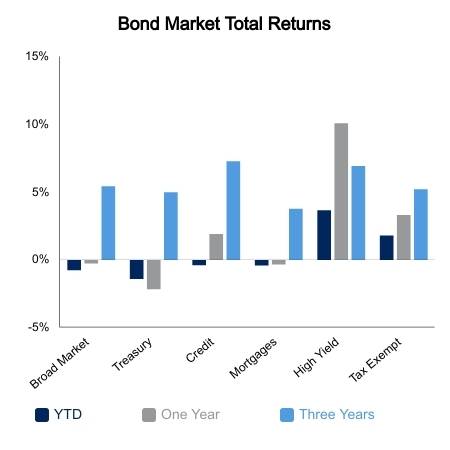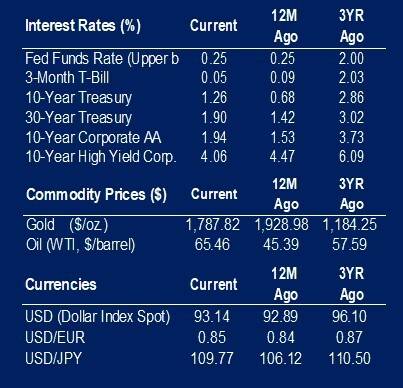The second quarter earnings season approaches a close with 95% of S&P 500 companies having reported results. It was a strong quarter for companies. Earnings and sales are up 94.40% and 25.97% respectively. These growth numbers are 16.30% and 4.65% better than expected. Growth in earnings was led by the Financials, Information Technology and Energy sectors. Sales growth was led by Energy, Consumer Discretionary and Health Care.
Markets are down this week despite the strong reports we have seen. The weakness has been attributed to concerns about the economic impact of increasing COVID-19 cases. The loss of 101 basis points was led by underperformance in the Energy, Materials and Industrials sectors. In Industrial, airlines detracted the most as travel concerns increase. Real Estate and Utilities were the only sectors up more than 1%.
Retail sales were down 1.1% in July. The decrease was steeper than the expected drop of 0.3%. Motor vehicles and parts dealers led the decline, down 3.9%. Nonstore retailers were down 3.1% but miscellaneous store retailers were up 3.5%. Clothing and clothing accessories stores were down 2.6%.
The Producer Price Index (PPI), which measures the average change over time in the selling prices received by domestic producers for their output, was up 1% in July. This contributes to a year-over-year increase in prices of 7.8%. Most of July’s increase came from a 1.1% increase in prices for final demand services. This is the largest one month increase since data was first calculated in December 2009. Increases in autos accounted for 20% of the rise.
Initial readings for the Michigan Sentiment Indicator find the number down to 70.2 from 81.2 last month. The dip may be tied to renewed COVID concerns.
Housing starts were down 7% to 1.534 million in July. High prices for materials continue to contribute to developers postponing building. The number of building permits issued came in at 1.635 million versus the expected 1.620 million. The spread between houses authorized for construction and houses with construction actually started is the third highest on record.
There was an increase in business inventories of 0.8% in June, an increase of 0.7% was expected. Increasing inventories are indicative of businesses expecting demand to increase.
 |
 |

Source: BTC Capital Management, Bloomberg LP, Ibbotson Associates, FactSet, Refinitiv.
The information provided has been obtained from sources deemed reliable, but BTC Capital Management and its affiliates cannot guarantee accuracy. Past performance is not a guarantee of future returns. Performance over periods exceeding 12 months has been annualized.
The information within this document is for information purposes only and is not intended as an offer or solicitation with respect to the purchase or sale of any security. Statements in this report are based on the views of BTC Capital Management and on information available at the time this report was prepared. Rates are subject to change based on market and/or other conditions without notice. This commentary contains no investment recommendations and you should not interpret the statement in this report as investment, tax, legal, and/or financial planning advice. All investments involve risk, including the possible loss of principal. Investments are not FDIC insured and may lose value.

